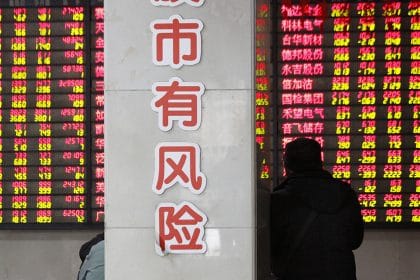The delisting of Chinese stocks in the US is a sign of an official end to US markets serving as a firehose of capital for buzzy Chinese tech firms. In addition, it is decreasing China’s reliance on the US stock markets while building up a homegrown rival.
The US-China trade war seems to be in full swing now. As both Washington and Beijing are triggering regulatory pressure on stocks trading, investors should be very careful with their portfolios. According to Jack Siu, the chief investment officer for Greater China at Credit Suisse Group AG (NYSE: CS), there is a risk of delisting Chinese stocks in the US. Therefore, investors should diversify their shares.
Credit Suisse CIO about Chinese Stocks
“The uncertainties to regulatory-related events are presenting risks to investors in the next 12 to 18 months. As a result, we think it’s prudent for holders of these stocks to diversify, hedge their exposure, maybe switch to some of the Hong Kong-listed stocks where there’s a dual listing to hedge against this delisting risk,” stated Jack Siu.
Last week, the US Securities and Exchange Commission (SEC) finalized amendments to the Holding Foreign Companies Accountable Act (HFCAA). According to the new rules, foreign companies must open their books to US auditors. Otherwise, they will be delisted from US markets if they don’t comply for three years. According to SEC, the new rules will allow investors to identify foreign companies listed in the US that are not allowing the Public Company Accounting Oversight Board (PCAOB) to inspect their audits.
Meanwhile, Chinese regulators are scrutinizing the corporate structure used by companies that list overseas. According to those familiar with the matter, China is planning to ban companies from going public on foreign stock markets through variable interest entities. Last Friday, following the news, the ten largest Chinese companies trading in the United States lost about $83 billion in market value.
As Jack Siu believes, there could be further regulatory actions from both countries.
Didi’s Exit from US Market
Following the regulatory scrutiny, Chinese ride-hailing giant Didi (NYSE: DIDI) announced delisting its shares from the New York Stock Exchange. Notably, just six months ago, Didi was raising billions of dollars from US pension funds and international investors in an Initial Public Offering (IPO). Instead, Didi will list its shares in Hong Kong.
Didi said:
“Following careful research, the company will start delisting on the New York Stock exchange immediately and start preparations for listing in Hong Kong.”
The delisting of Chinese stocks in the US is a sign of an official end to US markets serving as a firehose of capital for buzzy Chinese tech firms. In addition, it may also help accomplish another Beijing’s goal. In particular, it is decreasing its reliance on the US stock markets while building up a homegrown rival.
next